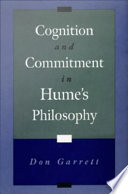 ALL THE perceptions of the human mind resolve themselves into two distinct kinds, which I shall call impressions and ideas. The difference betwixt these consists in the degrees of force and liveliness with which they strike upon the mind and make their... ALL THE perceptions of the human mind resolve themselves into two distinct kinds, which I shall call impressions and ideas. The difference betwixt these consists in the degrees of force and liveliness with which they strike upon the mind and make their...  Annual Burns Chronicle and Club Directory - Strana 61904Úplné zobrazenie Annual Burns Chronicle and Club Directory - Strana 61904Úplné zobrazenie - O tejto knihe
 | Gayle L. Ormiston, Raphael Sassower - 1989 - Počet stránok 178
...Hume's discourse on knowledge and, thus, the labyrinth of fictions constituting his texts. Hume begins: "All the perceptions of the human mind resolve themselves...distinct kinds, which I shall call Impressions and Ideas."41 As with other general principles articulated in Hume's text, this principle is presented... | |
 | Alexander Broadie - 1990 - Počet stránok 174
...certainly had never dreamed. In the first sentence of Part I of A Treatise of Human Nature Hume writes: 'All the perceptions of the human mind resolve themselves...kinds, which I shall call IMPRESSIONS and IDEAS.' This distinction, which is of the first importance for both the content and the mode of exposition... | |
 | Elvin W. Jones - 1991 - Počet stránok 354
...similarly detailed consideration of the not unrelated35 requirement that each pratyâkça be nonillusory. All the perceptions of the human mind resolve themselves...distinct kinds, which I shall call Impressions and ¡deas. The difference betwixt these consists in the degree of force and liveliness with which they... | |
 | Eva T. H. Brann - 1991 - Počet stránok 828
...as he says, "modification." The famous first sentence of the Treatise runs: "All perceptions of the mind resolve themselves into two distinct kinds, which I shall call IMPRESSIONS and IDEAS." Impressions appear when people are looking with open eyes, whereas ideas are the representations of... | |
 | Michael M. Gruneberg, Peter Edwin Morris - 1994 - Počet stránok 346
...Empiricist view of memory in a full and clear manner. Hume begins his Treatise with the statement that 'All the perceptions of the human mind resolve themselves...distinct kinds, which I shall call impressions and ideas' . Impressions are 'all our sensations, passions, and emotions, as they make their first appearance... | |
 | Lubor Velecky - 1994 - Počet stránok 156
...expresses his perspectival viewpoint as does the opening sentence of Hume's Treatise 'All the preception of the human mind resolve themselves into two distinct...kinds, which I shall call IMPRESSIONS and IDEAS.' (Cf. also footnote 21 below.) - Wittgenstein had a proper appreciation of the status of such utterances... | |
 | Oliver A. Johnson - 1995 - Počet stránok 398
...explanation of three central concepts of his epistemology. The first four sentences read as follows: All the perceptions of the human mind resolve themselves...IDEAS. The difference betwixt these consists in the degrees of force and liveliness, with which they strike upon the mind, and make their way into our... | |
 | R. A. Watson - 1995 - Počet stránok 202
...Treatise of Human Nature with a classic statement of the notion that ideas resemble their objects: All the perceptions of the human mind resolve themselves...IDEAS. The difference betwixt these consists in the degrees offeree and liveliness with which they strike upon the mind, and make their way into thought... | |
 | Jean-Pierre Changeux - 1997 - Počet stránok 376
...associationist theories on the nature of ideas. In his Treatise of Human Nature, David Hume wrote: "All the perceptions of the human mind resolve themselves...ideas. The difference betwixt these consists in the degrees of force and liveliness with which they strike upon the mind. . . . Those perceptions which... | |
 | Don Garrett Associate Professor of Philosophy University of Utah - 1996 - Počet stránok 289
...distinction of mental objects or entities, which he calls "perceptions," into "impressions" and "ideas": ALL the perceptions of the human mind resolve themselves...IDEAS. The difference betwixt these consists in the degrees of force and liveliness, with which they strike upon the mind, and make their way into our... | |
| |